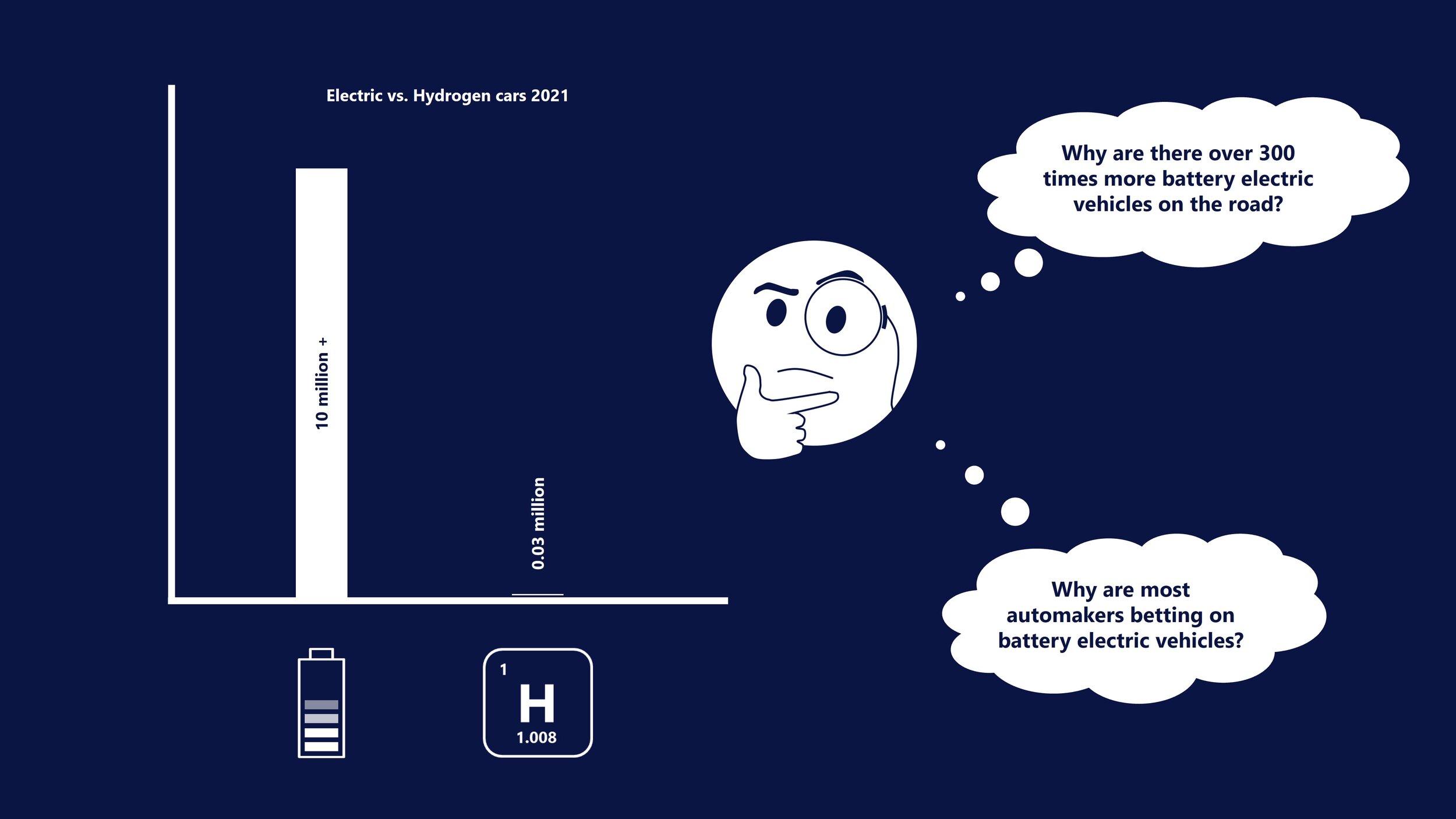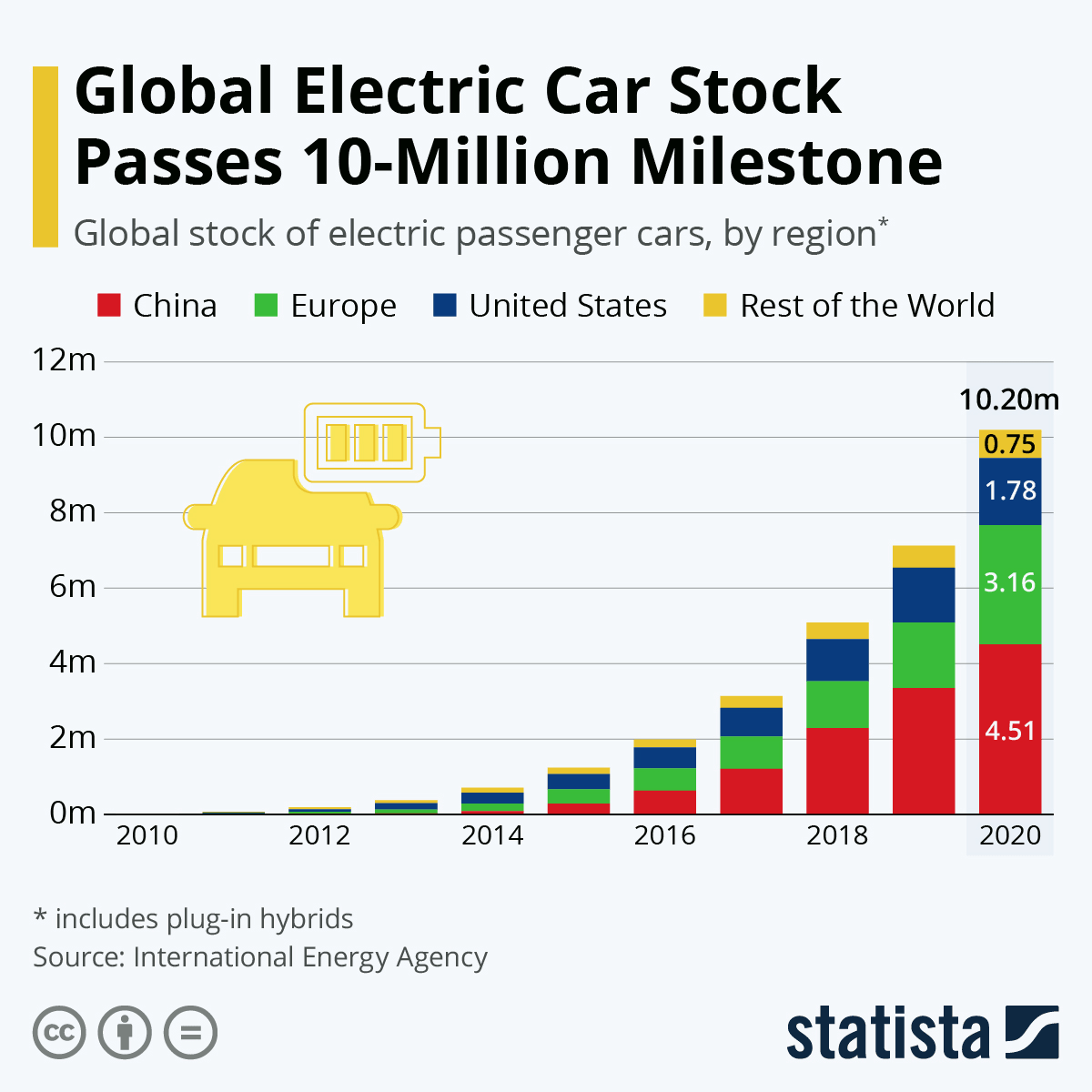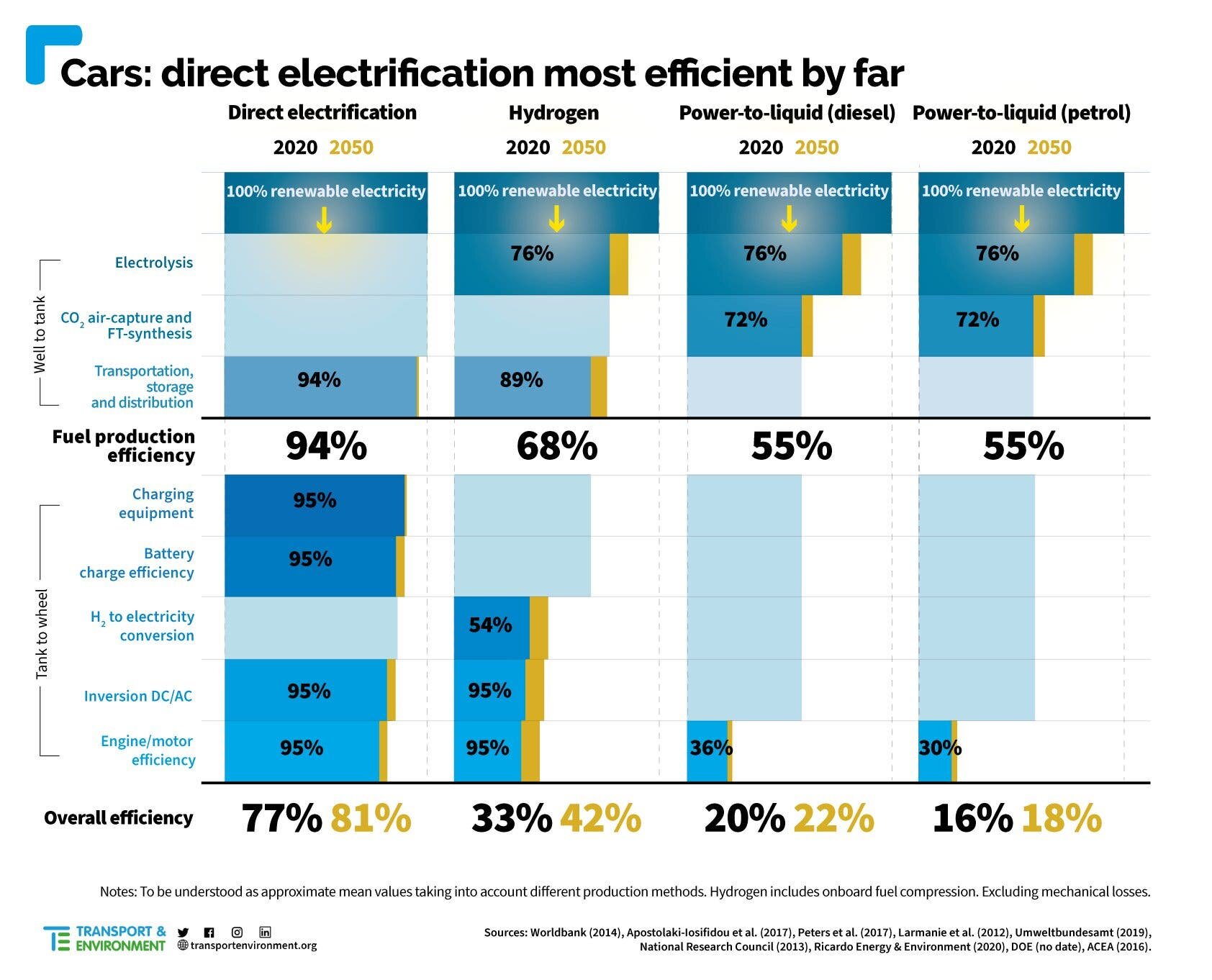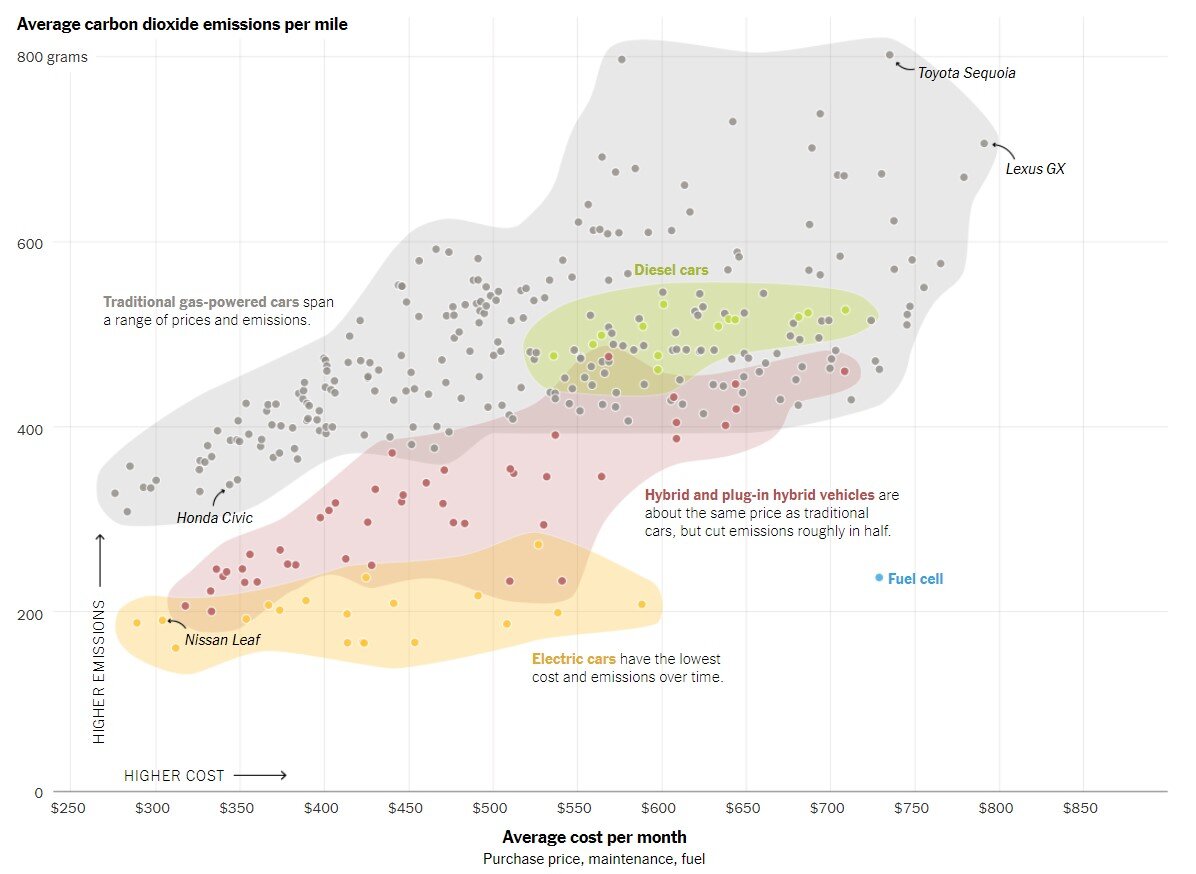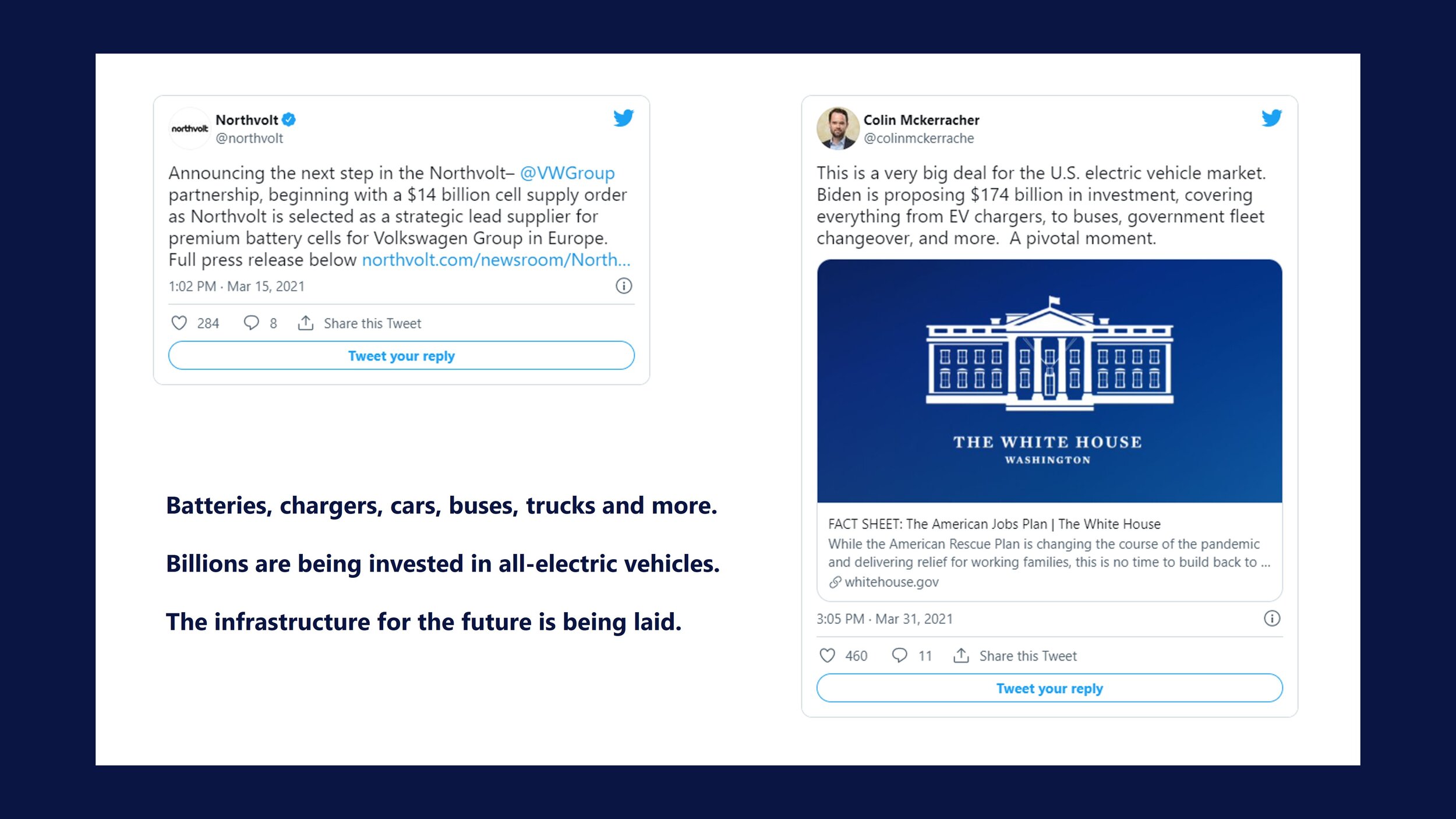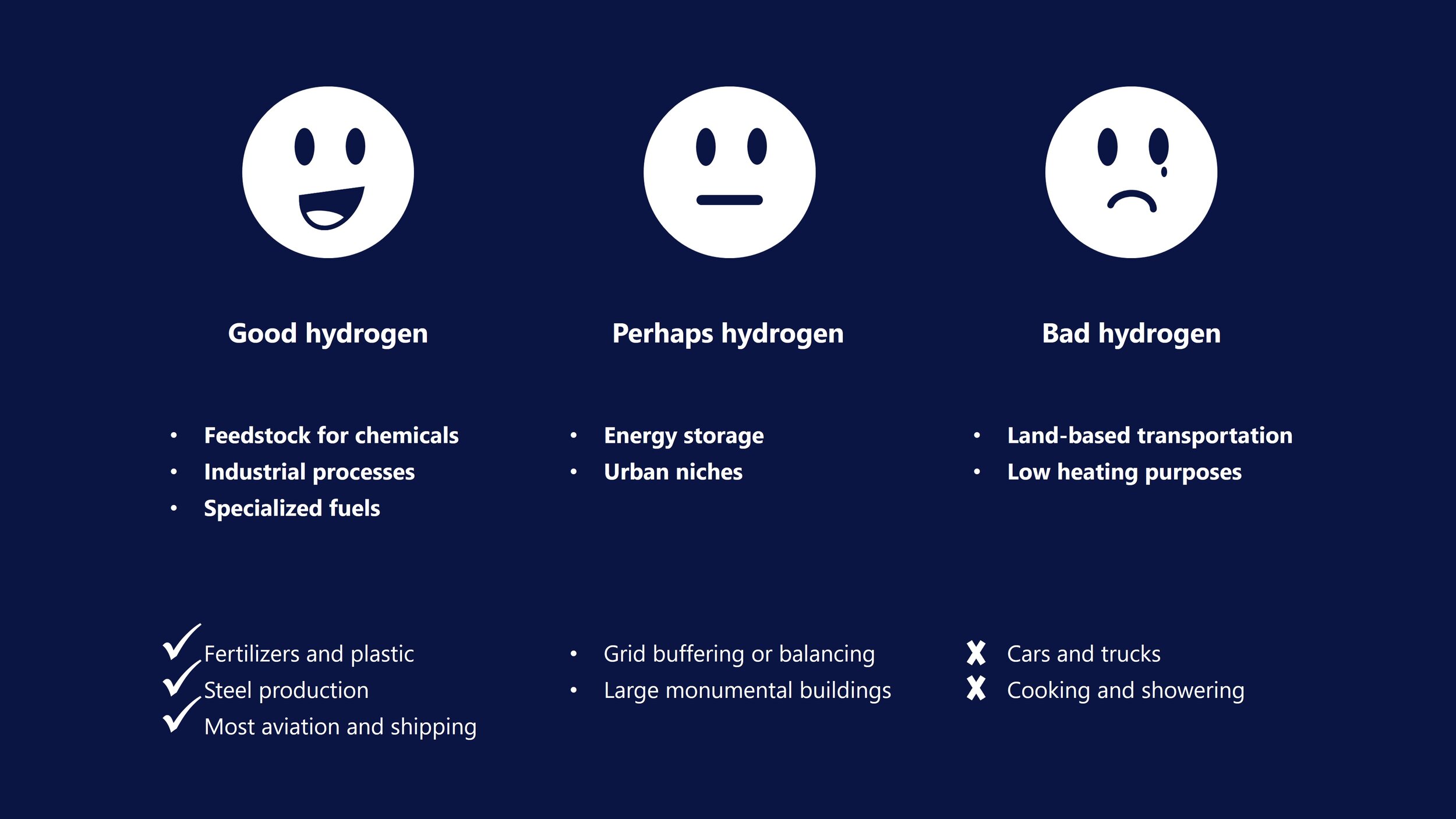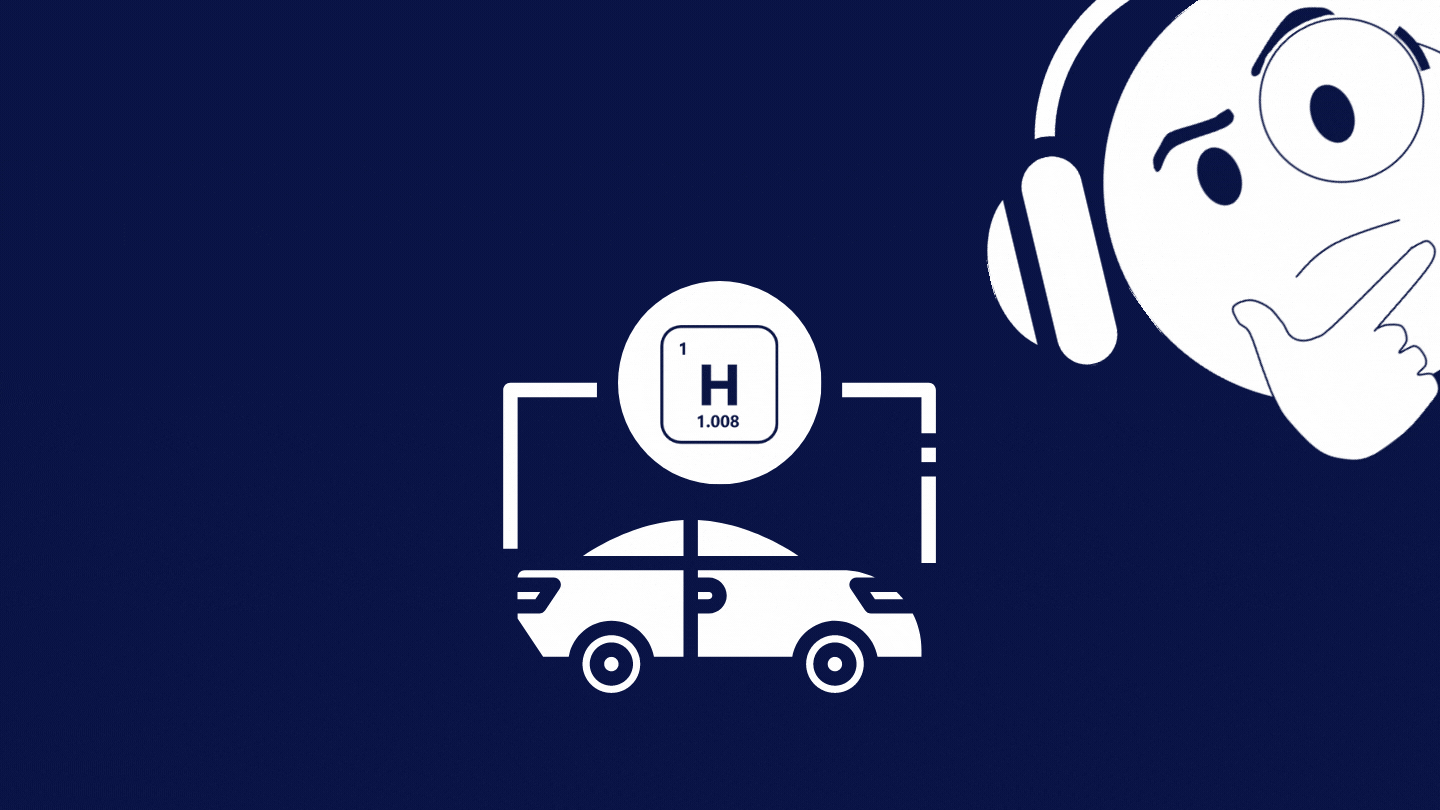Hydrogen Cars. Smart or DuMb?
Not smart
Summary - Hydrogen has a key role to play in our sustainable future. Except for cars. It is time we acknowledge the future of land-based transport is battery-electric, not hydrogen-powered. This blog explores the beauty of hydrogen and why we should not put it into our cars - of any size.
Don’t agree? Prove us wrong in the comments! You can also listen to this episode as a podcast.
Hydrogen has a bright future …
Hydrogen is a thing of beauty, there is no denying it.
An elusive primal element - the most abundant matter in the universe but not Earth - and arguably one of the most energetic compounds available to us. It has been heralded as ‘that thing that will power our future’, despite the fact we are already use copious amounts of hydrogen gas. We consume roughly 69 million metric tons of grey hydrogen per year, most of which (38 million tons) is used for refining fossil fuels. But this is all about to change.
The EU Hydrogen Strategy describes hydrogen as one of the key ingredients to Europe’s Green Deal, which aims for a strict 2030 emission-reduction target and the elimination of net greenhouse gas emissions by 2050. The funding involved in this program is massive. As described in the Just Transition Mechanism, they aim to mobilize at least €100 billion over the period 2021-2027 in the regions most affected by the move towards a green economy. And they are not the only ones preying to dominate the hydrogen market.
Saudi Arabia also has a plan to rule the hydrogen market. They plan to invest $700 billion into a massive solar-powered green hydrogen production facility, the largest ever constructed. Considering the billions and billions we are collectively pouring into the development of green hydrogen, it would surely be a good thing to develop hydrogen cars, right?
Maybe not.
… But hydrogen cars do not
As of 2021, there are two models of hydrogen cars publicly available in select markets. The Toyota Mirai, which is the world's first mass produced dedicated fuel cell electric vehicle (FCEV, a fancy acronym for hydrogen car), and the Hyundai Nexo. Next to Toyota, only a few other companies are still exploring hydrogen cars, while Volkswagen has expressed that the technology has no future in the automotive space. “No future” is quite a harsh statement to say. What is their argument for saying this?
Volkswagen states that fuel cell electric vehicles consume about three times more energy than a full-electric car for each kilometre driven. That is a very solid argument, based in physics, which might be the main reason why there are only so little hydrogen cars on the road. As of December 2020, there were 31,225 hydrogen-powered passenger vehicles around the world. At the same time, there were over ten million (!) fully electric vehicles driving around.
This stark difference got me thinking. What makes this difference so great? Why, despite billions of euros of investments and what seems to be decades of experience in hydrogen, are hydrogen cars ‘losing the game’?
I believe that is because of the following reasons.
> Hydrogen is inefficient
According to Inside EEVS, electric cars achieve efficiencies of anywhere between 70 and 90 percent, depending on the model and how much energy it takes for electricity to be transported prior to storage. In contrast, “45 percent of the energy is already lost during the production of hydrogen through electrolysis,” read a March 2020 press release by Volkswagen. “Of this remaining 55 percent of the original energy, another 55 percent is lost when converting hydrogen into electricity within the vehicle.” That would give hydrogen-powered cars an efficiency of only 25 to 35 percent.
“In concrete terms this means that a hydrogen car consumes two to three times more electricity for the same distance than a battery car,” the Volkswagen statement concluded. “But we cannot afford this kind of energy waste.”
A similar opinion is shared by Tesla CEO Elon Musk, proclaiming hydrogen fuel cell cars to be ‘staggeringly stupid’. As usual, he does not mince words.
Hydrogen is riddled with inefficiencies in every step of the way - production, transportation, storage and conversion. Then again, who cares about this? In the end, all that matters is how much it will cost you, right? I’m afraid hydrogen also pulls the short straw when it comes to costs.

> Hydrogen is expensive
An article published by the New York Times shows that battery-electric vehicles are the cheapest option in the long run, despite the higher upfront cost. To reach this conclusion, a team at the Massachusetts Institute of Technology calculated both the carbon dioxide emissions and full lifetime cost — including purchase price, maintenance and fuel — for nearly every new car model on the market including fuel cells.
The MIT team concluded that generally speaking, electric cars have the lowest cost and lowest amount of emissions over time. They displayed this fact nicely in the graph below, which shows that hydrogen cars (fuel cells) are up to three times more expensive than the Nissan Leaf. The fact that hydrogen cars are more expensive is even backed up by automakers that are still exploring the technology, like BMW.
They state that fuel cell vehicles cost almost twice as much as comparable fully electric or hybrid vehicles, mainly due to their small volumes of production and the need for the precious metal platinum in fuel cells. But these are not the biggest issues plaguing hydrogen cars.
Currently, the biggest shortcoming of hydrogen fuel cell cars is the sparsity of options for refuelling. At the end of 2019 there are were only around 40 refuelling stations in the U.S., as compared to approximately 80 in Germany.
Given the fact that the entire distribution network is still to be developed, which automaker would dare to take this challenge? The answer is: not a lot.

> Automakers are shifting towards all-electric
In 2019, the German auto industry witnessed a historic event, which was largely unnoticed by the rest of the world. In a rare act of unity, the leaders of the country’s big three automakers; Volkswagen CEO Herbert Diess, Daimler CEO Dieter Zetsche, and BMW CEO Harald Krüger, all agreed that the future of German auto is the electric car. Over the next decade, each CEO would be pushing their respective companies to shift and embrace the idea of an electrified fleet. These players represent a significant portion of the global automaker industry, but this statement as already two years ago. What is the current status?
Public sources state that Volkswagen wants half of all their cars sold to be fully electric by 2025 and stop combustion engine development shortly thereafter. They have already secured a $14 billion deal with Northvolt to provide the monstrous amount of batteries required. Daimler claims that all newly launched architectures will be electric-only from 2025 onwards.
BMW is - from what can be told from public sources - leaning on two legs, but also claims that about half of total sales will be fully electric by 2030. It does not help that Mr. Krüger has passed on his role as CEO to Mr. Zipse, and thus it remains unclear what course BMW is now sailing with regards to hydrogen-powered cars. There is only one major player in the industry that remains a blocker. Toyota.
In recent months, Toyota, one of the world’s largest automakers, has quietly become the industry’s strongest voice opposing an all-out transition to electric vehicles — which proponents say is critical to fighting climate change. According to some, “Toyota has gone from a leading position to an industry laggard”, despite the efforts of other automakers and governments around the world to accelerate the transition to fully electric vehicles. Even after the American Jobs Plan was made public - a $174 billion proposal made by the Biden Administration covering everything from EV chargers, to buses, government fleet changeover, and more - Toyota is actively blocking electric vehicles development by stating that the goals set are ‘not practical’.
Some automakers take advantage of their 'cannot-do’ attitude by simply conquering their market share. Like Tesla.
Tesla plans to produce 20 million electric vehicles per year by 2030, fifty times its 2019 production. If they manage to realize their plans as communicated in their 2020 battery day, they will not only conquer the electric car market. They will also conquer the heavy-duty truck market.
> All-electric trucks are next
Many people claim - or regurgitate the argument from mostly fossil lobby groups - that heavy duty trucks have to be hydrogen powered. This common misconception is sometimes viewed as a fact, as if there is some kind of law of physics against battery-electric trucks. It is time to let go of the myth that heavy land-based transport - like trucks - are unsuitable for batteries.
While still under development and already significantly delayed, there is no doubt that the Semi will hit the streets like a meteor once it is released. As with all Tesla vehicles, it looks as if the vehicle comes straight from a Star Trek movie set. But this beauty is not just about looks. It has some serious brains and a badass performance to match.
Because of a drag coefficient that is less than a Bugatti Veyron, Tesla boasts that the truck can accelerate from 0-60 mph with 80k lbs load in 20 seconds. I do not speak imperial, but judging from the videos I can imagine it is like a Space Mountain ride at Disney World. In addition it has similar self-driving features Tesla drivers have grown accustomed to. Together with four independent motors, it dramatically increases safety for the truck driver and could eliminate the possibility of jackknifing, which is a thing truck drivers fear most. All this comes with a range of up to 500 miles and an acclaimed 30 minutes (!) of charging time.
In the end however, it is not about how pretty it looks or how it makes you feel like Captain Kirk while you drive one. It’s weight and the cost-per-mile to move a vehicle that matter. And that’s where the rubber meets the road.
Tesla's claims overall operating cost of $1.26 a mile for the Semi, versus $1.51 a mile for a competitive diesel truck. If Tesla manages to pull this off, it would effectively mean that you are losing money if you are not driving a Tesla truck. How much? According to Tesla, the ongoing operation will add $200,000 to a trucking company’s balance sheet over the course of a truck’s expected million-mile lifetime.
Tesla is slowly and secretly building their army of semi trucks. Once released upon the world, they might change the way we live and think forever.

Hydrogen cars = not smart
What then are smart solutions for hydrogen?
We will need every drop, globule and gas molecule of hydrogen that we can sustainably make in the future. Hydrogen is absolutely crucial and will play a key role in decarbonisation if produced in an environmentally friendly way. The billions and billions that are being poured into the development of electrolyzers - in the hope that this will significantly reduce the costs of electrolysis to create green hydrogen - are therefore worth every penny.
But we need to be clear about what that green hydrogen should be used for, and what it should not be used for.
We need this green hydrogen as feedstock for the chemical industry. It could be used for (seasonal) energy storage in a lot of places, especially those places that are mostly dark in winter. But most of all, we will need it for what are called the “hard-to-abate” sectors: for steel, cement, aviation and shipping, as I explained in a previous blog on how to build green hydrogen refineries in Rotterdam. And that’s it.
Just like the German car industry in 2019, we need to get our act together and start focussing on the things that are important. And an important thing when focussing on important things, is to know what not to focus on - hydrogen cars.
Personal Note
> Hydrogen good. Hydrogen cars bad.
Let me be blunt. I believe hydrogen cars are dumb. Nonetheless, I am still a huge fanboy of hydrogen. I can imagine people might not understand this proper, so let me re-iterate.
Hydrogen is absolutely crucial in chemical processes, can potentially be used for seasonal storage and will play a key role in decarbonisation if produced in an environmentally friendly way. I simply believe we are trying to open the wrong lock with it. Hydrogen cars are not only the wrong lock, they are the wrong door completely.
Despite their engineering beauty - which I most definitely respect - I believe hydrogen cars and most forms of transport shift focus of hydrogen to the wrong place. In that regard I view hydrogen research and development as a near-zero-sum game, which is not how I normally see things. Somehow, it feels to me as if the billions of euros and lifetimes spent on engineering are poured into a place where they will not do us a lot of good.
I believe the billions that are being invested in hydrogen car technologies will not lead to a better, more sustainable future. They lead to delays, delusions and the enrichment of the few, not to the betterment of mankind. Put these billions where they belong. Put them in improving sustainable battery technology. Put them into improving hydrogen catalysers. Put them into specialized marine fuels, made with green hydrogen.
But whatever you do, don’t put them into your car.

Reference & More Stories
Mr. Sustainability - Hydrogen Insights
Mr. Sustainability - The ‘Tesla Effect’ hits Germany as VW, Daimler, and BMW go Full-Electric
Wikipedia - Hydrogen Vehicle
De Correspondent - Waarom de elektrische auto nu al groener rijdt maar er betere argumenten zijn om over te stappen
Inverse - Tesla CEO Elon Musk criticizes fuel cell idea: ‘staggeringly dumb’
New York Times - Electric cars are better for the planet - and often your budget too
New York Times - Toyota led on clean cars. Now critics say it works to delay them
Scania - Scania’s commitment to battery electric vehicles
Forbes - Why Are We Still Talking About Hydrogen?
